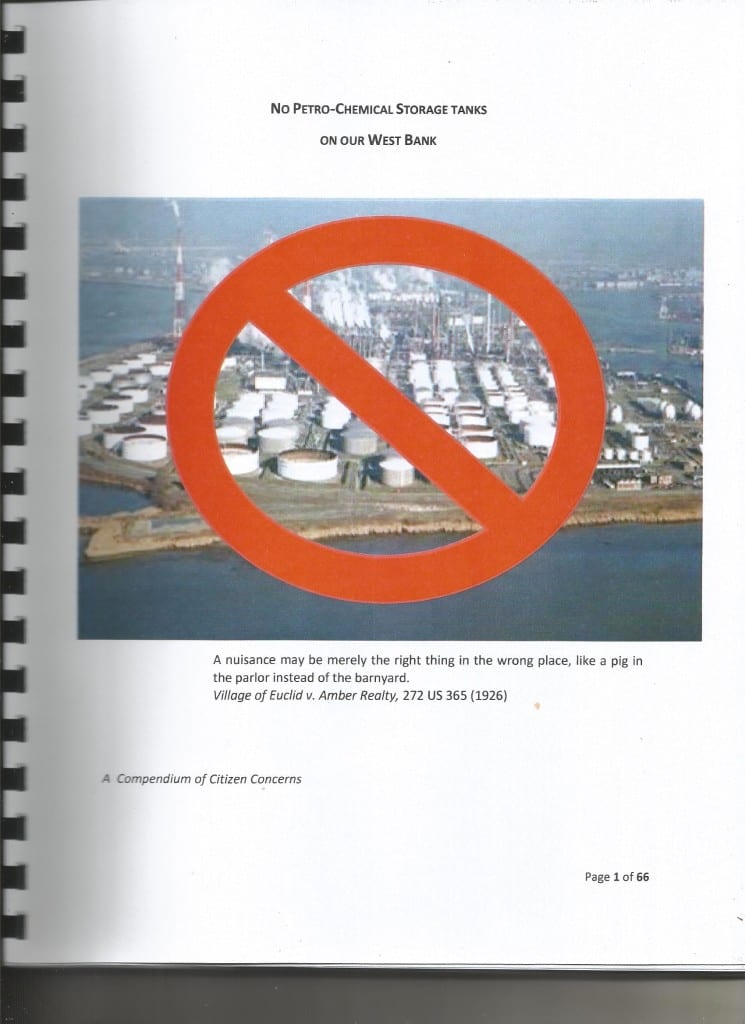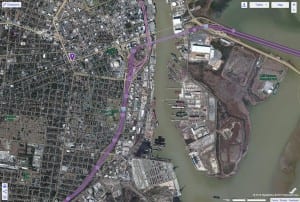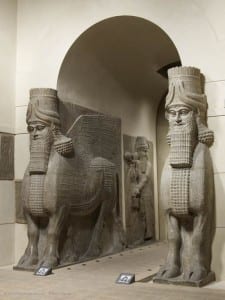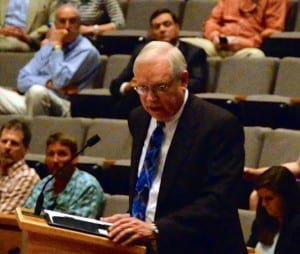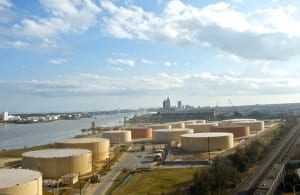By David Underhill –
MOBILE, Ala. – After a couple years trudging through the weeds and thickets of laws, regulations, technical standards, hazard assessments, health effects, economic impacts and other consequences of petroleum storage tanks, Mobile has arrived at nearly the same place it began this trek.
On June 11 a three-member subcommittee presented its tank farm report to the full planning commission of the city. This formally ended a spasm of study that began in 2013 when local citizens noticed plans for tank expansions springing up like toadstools after a rainstorm. These were mainly folks alerted and activated by their resistance to plans for a crude oil pipeline through the watershed of the municipal drinking water reservoir. This primed them to see the sprouting of tank farms—mostly in the downtown port area—and the associated pipelines as a sign of intentions to turn the city into an even bigger fossil fuel handling hub than it is already.
They raised a big enough fuss to catch the ear of politicians on the city council, a majority of whom edged toward enacting a moratorium on construction of new storage tanks. This provoked enough alarm from chamber of commerce and shipping interests to make the council back away from its moratorium.
Instead, the council created a citizens’ advisory committee and shuffled the tank farm hassles off to them. After months of diligent study they arrived at consensus—mostly. They couldn’t agree on the size of safety buffer zones between tank farms and nearby neighborhoods. Residential area voices wanted setbacks one-half mile or more for the dangerous tank farms. Industrial voices wanted much less.
Meanwhile, newly elected mayor Sandy Stimpson—previously head of the chamber of commerce—had purged the planning commission and appointed a batch of new members. They confessed ignorance when the advisory committee delivered its report. So they formed a subcommittee to restudy the issue, and its report has at last been delivered to the rest of the planning commission.
Castrating Citizens’ Advice
This report is a tame document with zero mention of a moratorium on tank farm construction or of anything even faintly resembling a moratorium. It merely recommends a dozen largely procedural changes in the city’s zoning ordinance, mostly dealing with notifying neighbors about pending projects and safety agencies about contents of tanks.
But nestled among the modest changes is one saying: “There shall be a one thousand (1,000) foot minimum setback for all new above ground oil storage tanks…The setback shall be measured from the tank to the property line of the closest residential structure, park, church or school.”
This is the key castration of the report from the defunct citizens’ advisory committee. Not only does it obliterate the half mile (2,640 feet) setback sought by the residential representatives, but it also strategically alters the manner of measuring the setback.
The advisory committee had said it should be measured from the “tank developments,” including “associated transfer and delivery systems,” to the nearest “residential community” or “historic district,” among other specified protected areas. This meant measuring the setback not from the tanks themselves but from the boundary of the project site, some of which showed railroad tanker car unloading tracks as the component closest to neighboring homes. And it meant measuring the setback to the boundary of a residential or historic area, not to structures within it.
By subtly altering the measure of the setback this new report by the new mayor’s newly appointed planning commission subcommittee allows stinky, hazardous rail and truck transfer facilities to crowd right against residences, as long as the tanks receiving the cargoes from these vehicles are further away. And the altered measure allows nearby residential or historic zones to count toward the setback for the tanks, as long as no structure exists where the measure is made.
Compendium of Concerns
None of this surprised the local activists opposing the mushrooming tank farms. Earlier sessions of the mayor’s reformulated planning commission had shown this body’s inclinations. So the activists were ready after last week’s session to hand out A Compendium of Citizen Concerns titled “No Petro-Chemical Storage Tanks on Our West Bank.”
Mobile spreads around the mouth of the river at the top of the bay. Industry walls the river’s east bank for miles. On the west bank is some industry, the highrise downtown, the port and rail yards, and some residential sections including Africatown, landing site of the last slave ship to the U.S.
Four themes run through their statements:
Betrayal – Despite the flight to the suburbs from the 1960s onward, some stayed or returned relying on assurances from municipal leaders that long range plans would revive downtown into an appealing place for residences, businesses and tourists. Now the waterfront is on the verge of becoming a hazardous, reeking, polluted ward of the global petrochemical colossus.
Risk/benefit – The tank farm promoters from afar—along with their local allies and agents—adore concentrating attention on the benefits of their schemes. They skimp on, or totally ignore, the detriments. These range from slow, chronic health effects, to shrunken values of nearby homes and other properties, to catastrophic risks from accidents and hurricanes. The ghost of BP’s exploding offshore oil well hovers around all these topics.
Negative externalities – Undesirable consequences of tank farms drift off the projects’ sites and off the corporations’ accounting books. These external costs—whether to health, or property values, or nostrils, or peace of mind, or whatever—must be borne by others outside the corporations’ responsibility.
Opportunity cost – Doing one thing with your waterfront, such as covering it with tank farms, costs you the opportunity to do other things with that waterfront. Asserting the economic benefits of tank farms without noting the alternate uses lost is a deception. When tank farm advocates peddle this deception, the community needs to expose and correct it.
Sentinels of Babylon
None of this matters to the tank farmers. They intend to press ahead regardless of objections.
Two looming forms made this apparent at last week’s meeting. Jimmy Lyons, head of the state’s port authority, had no role in the proceedings, which were solely for the subcommittee to offer its report to the full planning commission, with no input from the public. Nor had Jarrod White any role. He has been the intruding pipelines’ and tank farms’ lead local attorney who propelled the reservoir pipeline forward against a storm of resistance.
These two tank farm boosters sat mute in the audience throughout the meeting. Members of the planning commission surely saw them but said nothing about their presence—just as travelers arriving at ancient Babylon likely stooped in silence when they passed the monumental winged bull sentinels beside the gate to enter into the city and into glory.
And where those zones are near homes, not even the recommended 1,000 foot setback for tanks is actually a firm 1,000 foot setback. As Watkins explained later in the meeting, this number was a negotiated consensus among the subcommittee members, and he didn’t know whether 100 or 10,000 feet was really the right number.
Besides, he added, even if the city wrote this 1,000 foot buffer into its zoning ordinance, a tank farm developer might go to the board of adjustment and get that reduced. This board grants variances in particular circumstances, as it sees fit.
What might seem fitting? The city planning department’s files about tank farms contain a statement from Tom Wade, a professional engineer with expertise in fire protection. He says applicable industry safety standards allow oil storage tanks within 82 feet of a site’s property line, and “new tanks constructed in Mobile must currently comply with this requirement.”
What would prevent the board of adjustment from deciding that future tanks should also comply with this requirement? Then the actual minimum buffer between a storage tank and a home would not be a 1,000 foot setback decreed in a zoning ordinance—it would be 82 feet.
Buffering By Removing
Instead of shrinking the buffer in this way a tank farm schemer might create a true 1,000 foot setback not by moving tanks away from houses but by removing houses. The newly proposed rule invites developers to do this because it measures the setbacks from tanks to nearby residences.
If the homes disappear, the required buffer magically appears—rather than creating the setback by locating the tanks further back on the project site to keep them away from houses. A developer could fill his entire site with tanks and create the setback by buying and demolishing nearby homes until he had cleared a swath 1,000 feet wide. New zoning ordinance complied with!
This sort of maneuver would specifically threaten Africatown. The initial drawings for a giant tank farm there showed some tanks closer than 1,000 feet from existing homes. Developers might offer owners very attractive prices to sell out and get out. And another slice of the community would be gone.
To prevent such clever whittling and all the other detriments of storage tanks, the uprising against them has adopted slogans like: No More Tanks On Our Banks! But halting the tank expansions requires government intervention, and the mayor has repeatedly pledged to make Mobile the “most business friendly city in America.” This means, among other things, shrinking rules and regulations—which is the opposite of what’s necessary to halt the tanks.
And halting them requires overcoming the powers symbolized by those two Babylonian idols seated at the planning commission meeting. The guardian bulls could improve their prospects by ceasing any efforts to counter the persuasive arguments in the Compendium. Its authors have already won the debate. There is no convincing retort to their assertions that whatever benefits investors might derive from tank farms, they are mostly bad news for the local community.
Prima Donna Welfare Queen
In answer to that the state port authority director Lyons might make a speech telling blunt truths. He could say:
Contrary to what you’ve been told, the genuine welfare queens are not in the housing projects. I am the reigning prima donna welfare queen of this region. The port I run would choke to death on silt except for the dredging done by the federal government. This dredging has to be constant and it ain’t cheap. We have lots of wealth here that we could tax to pay for such things. But we’d rather use the taxes paid to the feds by other folks in other places. And the amount given to us for dredging depends on the amount of cargo passing through the port. Tank farms mean tonnage into barges and ships that can nestle right up to the tanks like piglets to sows. And tonnage means money from Uncle Sugar in DC. It’s that simple. Sure, you’ve been told to hate Obamacare and most everything else coming from this president. And you’ve been told to despise the feds for plotting to turn the Mobile river delta into a national park. But don’t let your anger and distrust cloud your judgment. My CEO salary and your wages, if you have a job somehow connected with the port, depend on these handouts from DC. Otherwise we’d have to pay our own way by taxing ourselves to keep the port going. To keep the welfare coming from Uncle Sugar, add tank farm tonnage to the waterfront.
The Rapture will happen before this honest speech is made. Until then, the struggle over tank farms will continue. The publicly subsidized port and the private petrochemical companies will persist in pursuit of their joint interests. And the community interests asserted in the Compendium will try to mount a resistance.
From NIMBY to WIMBY
So far this resistance has a largely NIMBY tone. Not In My Back Yard. In varied phrasings that’s a recurring plea of the Compendium. Perhaps pig farms are necessary, the argument goes, but they don’t belong at my house.
Some different sounds ring from the statement by MEJAC. The Mobile Environmental Justice Action Coalition emerged from a spontaneous rising against pipelines and tank farms crowding into Africatown. Besides NIMBYish concerns, MEJAC speaks of attending to the needs of “all members of our urban environments, human and non-human alike,” and it paraphrases the Earth Charter by saying protection of the bay’s “vitality, diversity, and beauty is a sacred trust.”
Only one contributor pays attention to the consequences distant from Mobile in time and place when the contents of these huge oil tanks are burned. She is also the youngest contributor, pregnant with her first child, and mindful of the future that awaits her fledgling family. Refusing more tanks “is the best decision,” she says, “on a global scale related to the climate.”
Seattle made news recently when a flotilla of “kayaktivists” surrounded an offshore oil rig departing to drill in the Arctic ocean. They didn’t stop it, but they did delay it. Less noted than this picturesque media event was the scolding port managers received from the mayor and city council for aiding the rig’s mission by allowing it to dock in Seattle for maintenance.
These elected officials were explicitly addressing distant concerns that drilling would jeopardize the Arctic environment and would produce more fossil fuel jeopardizing the whole climate. “We don’t want to promote the idea of Arctic drilling,” explained a city council member.
Mobile has not arrived at attitudes like that, but it may be on the way. The Compendium is the founding document of an unlikely coalition melding geographic, ethnic and economic sectors of the city normally apart—if not estranged—from each other.
If that can happen, why not more expansive attitudes also? Leading away from NIMBY and toward WIMBY: the World Is My Back Yard.
Baby Steps
A first step could be getting the planning commission out of its comfy crib in the highrise downtown’s Government Plaza. Before any of the proposed changes about setbacks and other issues can take effect, citizens must have an opportunity to comment at a public hearing, maybe a couple of hearings if many wish to speak, commission chair Watkins said.
Many will, especially if a hearing is held after work hours in an impacted neighborhood instead of downtown at the government headquarters during a weekday. For instance: in Africatown, at a church or the community center, at night.
They will probably receive an invitation soon to improve their education in just this way. Jolting as that event might be for them, it would help them evolve toward WIMBYism by making them confront in person the consequences of their decisions.
With such small steps the scope of mutual concern can expand, eventually reaching even Washington perhaps. There the realization might dawn that it’s foolish to gear port funding to cargo tonnage, as if bigger is always better and deserves more money.
That would unshackle port managers from the brainless pursuit of ever bigger tonnages. Then they could afford to consider the consequences of their cargoes—for the local community and for the world.
Thus are WIMBY converts made.
David Underhill strives to be an accurate and objective reporter. He is also conservation chair of the Mobile Bay and Alabama Sierra Club, and he helped compile the Compendium.


